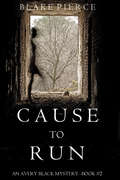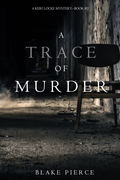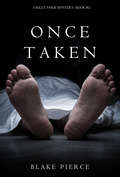
Блейк Пирс
Once Gone
Chapter 17
Riley cursed under her breath as she pulled into the parking lot beside a long, flat-roofed building. Three people wearing FBI jackets were standing outside, mingling with several local cops.
“This can’t be good,” Riley said. “I wish we’d gotten here before the hordes descended.”
“No joke,” Bill agreed.
They’d been told that a woman had been kidnapped from inside this small-town medical clinic, taken early this morning.
“At least we’re getting on it faster this time,” Bill said. “Maybe we stand a chance of getting her back alive.”
Riley silently agreed. In the earlier cases, no one had known exactly when or where the victim was kidnapped. The women had just disappeared and later turned up dead accompanied by cryptic signs of the killer’s mindset.
Maybe it will be different this time, she thought.
She was relieved that someone had witnessed enough of the crime to call 911. The local police knew about an alert for a serial kidnapper and killer, and they had called in the FBI. They were all assuming that this was the same deviant at work.
“He’s still way ahead of us,” Riley said. “If it’s really him. This is not the kind of place I expected our perp to grab someone.”
She had thought the killer would be stalking a parking garage or an isolated jogging trail. Maybe even a poorly lit neighborhood.
“Why a community clinic?” she asked. “And why in daylight? Why would he take the chance of entering a building?”
“Sure doesn’t seem like a random choice,” Bill agreed. “Let’s get moving.”
Riley parked as close to the taped-off area as she could. As she and Bill got out of the car, she recognized Special Agent in Charge Carl Walder.
“This is really bad,” Riley muttered to Bill as they walked toward the building.
Riley didn’t think much of Walder – a babyish, freckled-faced man with curly, copper-colored hair. Neither Riley nor Bill had personally worked a case under him, but he had a bad reputation. Other agents said that he was the worst kind of boss – someone who had no idea what he was doing, and was therefore all the more determined to throw his weight around and assert his authority.
To make matters worse for Riley and Bill, Walder outranked their own team chief, Brent Meredith. Riley didn’t know how old Walder was, but she was sure that he had risen up the FBI food chain too fast for his own good, or for anybody else’s.
As far as Riley was concerned, it was a classic example of the Peter Principle at work. Walder had successfully risen to the level of his incompetence.
Walder stepped forward to meet Riley and Bill.
“Agents Paige and Jeffreys, I’m glad you could make it,” he said.
Without niceties, Riley went right ahead and asked Walder the question that was nagging at her.
“How do we know it’s the same perp that took the other three women?”
“Because of this,” Walder said, holding out an evidence bag holding a cheap little fabric rose. “It was lying on the floor just inside.”
“Oh, shit,” Riley said.
The Bureau had been careful not to leak to the press that detail of his MO – how he’d left roses at the scenes where he’d posed the bodies. This was not the work of a copycat or of a brand new killer.
“Who was it this time?” Bill asked.
“Her name is Cindy MacKinnon,” Walder said. “She’s an LPN. She was abducted when she came in early to set up the clinic.”
Then Walder indicated the other two agents, a young female and an even younger male. “Perhaps you’ve met Agents Craig Huang and Emily Creighton. They’ll be joining you on this case.”
Bill audibly murmured, “What the – ”
Riley poked Bill in the ribs to shut him up.
“Huang and Creighton have already been briefed,” Walder added. “They know as much about these murders as you do.”
Riley fumed silently. She wanted to tell Walder that no, Huang and Creighton did not know as much as she did. Not even as much as Bill did. They couldn’t know that much without having spent as much time at the crime scenes, or without having spent uncounted hours poring over evidence. They didn’t have anything resembling the professional investment she and Bill had already put into this case. And she was sure that neither of these youngsters had ever summoned up the mind of a killer to get a sense of his experience.
Riley took a deep breath to stifle her anger.
“With due respect, sir,” she said, “Agent Jeffreys and I have got a pretty good handle on it and we’ll need to work fast. Extra help… won’t help.” She’d almost said that extra help would just slow them down, but had stopped herself in time. No point in insulting the kids.
Riley detected a trace of a smirk on Walder’s babyish face.
“With due respect, Agent Paige,” he replied, “Senator Newbrough doesn’t agree.”
Riley’s heart sank. She remembered her unpleasant interview with the Senator and something he had said. “You may not know it, but I’ve got good friends in the upper echelons of the agency.”
Of course Walder had to be one of those “good friends.”
Walder lifted his chin and spoke with borrowed authority. “The Senator says that you’re having trouble grasping the full magnitude of this case.”
“I’m afraid the Senator is letting his emotions run away with him,” Riley said. “It’s understandable, and I sympathize. He’s distraught. He thinks that his daughter’s killing was political or personal or both. It obviously wasn’t.”
Walder squinted his eyes skeptically.
“How is it obvious?” he said. “It seems obvious to me that he’s right.”
Riley could hardly believe her ears
“Sir, the Senator’s daughter was the third woman taken out of what are now four,” she said. “His time frame has been spread out over more than two years. It’s purely coincidence that his daughter happened to be one of the victims.”
“I beg to differ,” Walder said. “And so do Agents Huang and Creighton.”
As if on cue, Agent Emily Creighton piped in.
“Doesn’t this kind of thing happen from time to time?” she said. “Like, sometimes a perpetrator will stage another murder before killing his intended victim? Just to make it look serial and not personal?”
“This last abduction could serve the same purpose,” added Agent Craig Huang. “A final decoy.”
Riley managed not to roll her eyes at the kids’ naiveté.
“That’s an old, old story,” she said. “A work of fiction. It doesn’t happen in real life.”
“Well,” Walder said in an authoritative tone, “it happened this time.”
“We don’t have time for this,” Riley snapped. Her patience had run out. “Have we got any witnesses?”
“One,” Walder said. “Greta Tedrow made the 911 call but she didn’t actually see much. She’s sitting inside. The receptionist is in there too, but she didn’t see it happen. By the time she showed up at eight o’clock, the cops were already here.”
Through the clinic’s glass doors, Riley could see two women sitting in the waiting room. One was a slim woman in running clothes, with a cocker spaniel on a leash beside her. The other was large, middle-aged, and Hispanic-looking.
“Have you interviewed Ms. Tedrow?” Riley asked Walder.
“She’s been too shaken up to talk,” Walder said. “We’re going to take her back to the BAU.”
Riley actually did roll her eyes this time. Why make an innocent witness feel like a suspect? Why play the bully, as if that wouldn’t shake her up even more?
Ignoring Walder’s gesture of protest, she swung a door open and strode through the entrance.
Bill followed her in, but he left the interview to Riley while he checked a couple of adjoining offices, then poked around the waiting room.
The woman with the dog looked at Riley anxiously.
“What’s going on?” Greta Tedrow asked. “I’m ready to answer questions. But nobody’s asking me anything. Why can’t I go home?”
Riley sat in a chair beside her and patted her hand.
“You will go home, Ms. Tedrow, and soon,” she said. “I’m Agent Paige, and I’ll ask you a few questions right now.”
Greta Tedrow nodded shakily. The cocker spaniel just lay there on the floor looking up at Riley in a friendly manner.
“Nice dog,” Riley said. “Very well behaved. How old is he – or is it a she?”
“It’s he. Toby’s his name. He’s five years old.”
Riley slowly held her hand toward the dog. With the animal’s silent permission, she petted his head lightly.
The woman nodded an unspoken thank-you. Riley got out her pencil and notepad.
“Now take your time, don’t rush,” Riley said. “Tell me in your own words how it happened. Try to remember everything you can.”
The woman spoke slowly and haltingly.
“I was walking Toby.” She pointed outside. “We were just coming around the corner beyond the hedges, over that way. The clinic had just come into view. I thought I heard something. I looked. There was a woman in the clinic doorway. She was pounding on the glass. I think her mouth was gagged. Then someone pulled her backward out of sight.”
Riley patted the woman’s hand again.
“You’re doing great, Ms. Tedrow,” she said. “Did you see her attacker at all?”
The woman wrestled with her memory.
“I didn’t see his face,” she said. “I couldn’t see his face. The light was on in the clinic, but…”
Riley could see a flash of recollection cross the woman’s face.
“Oh,” the woman said. “He was wearing a dark ski mask.”
“Very good. What happened next?”
The woman became slightly more agitated.
“I didn’t stop to think. I got out my cell phone and called 911. It seemed like a long time before I could get an operator. I was on the phone talking to the operator when a truck came tearing out from behind the building. Its tires screeched going out of the parking lot, and it turned to the left.”
Riley was taking notes rapidly. She was aware that Walder and his two young favorites had come into the room and were just standing there, but she ignored them.
“What kind of truck?” she asked.
The woman knitted her forehead. “A Dodge Ram, I think. Yes, that’s right. Pretty old – maybe from the late nineties. It was very dirty, but I think it was a really deep navy blue color. And it had something on its bed. Kind of like a camper, only it wasn’t a camper. One of those aluminum tops with windows.”
“A cap?” Riley suggested.
The woman nodded. “I think that’s what they’re called.”
Riley was pleased and impressed by the woman’s memory.
“What about a license number?” Riley asked.
The woman looked a little bit taken aback.
“I–I didn’t catch it,” she said, sounding disappointed with herself.
“Not even one letter or number?” Riley asked.
“I’m sorry, but I didn’t see it. I don’t know how I missed it.”
Walder stooped down and whispered intensely in Riley’s ear.
“We’ve got to take her to the BAU,” he said.
He backed up a little as Riley rose to her feet.
“Thank you, Ms. Tedrow,” Riley said. “That’s all for now. Have the police already taken your contact information?”
The woman nodded.
“Then go home and get some rest,” Riley said. “We’ll be in touch again soon.”
The woman walked her dog out of the clinic and headed home. Walder looked ready to explode with rage and exasperation.
“What the hell was that all about?” he demanded. “I said we had to take her to the BAU.”
Riley shrugged. “I can’t imagine why we would do that,” she said. “We’ve got to keep moving on this case and she’s told us all she can.”
“I want one of our hypnotists to work with her. To help her remember the license number. It’s in her brain somewhere.”
“Agent Walder,” Riley said, trying not to sound as impatient as she felt, “Greta Tedrow is one of the most observant witnesses I’ve interviewed in a very long time. She said she didn’t see the license plate number, didn’t ‘catch’ it. Not even one number. That bothered her. She didn’t know how she could miss it. Coming from someone with a memory as sharp as hers, that can only mean one thing.”
She paused, challenging Walder to guess what that “one thing” might be. She could tell by his vacant expression that he had no idea.
“There was no license plate to see,” she finally said. “Either the attacker had removed it or it had been muddied up and made unreadable. All she saw was a blank space where the license plate should have been. If a legible license plate had been there, that woman would have caught at least part of it.”
Bill let out a snort of quiet admiration. Riley wanted to shush him, but figured that would only make matters worse. She decided to change the subject.
“Has the victim’s next of kin been contacted?” she asked Walder.
Walder nodded. “Her husband. He came here for a few minutes. But he couldn’t handle it. We sent him home. He lives only a few blocks away. I’ll send Agents Huang and Creighton to interview him.”
The two younger agents had been standing apart enthusiastically discussing something. At that moment, they turned toward Riley, Bill, and Walder. They looked very happy with themselves.
“Emily – er, Agent Creighton and I have got it figured out,” Huang said. “There was no sign of a break-in, nothing resembling forced entry. That means the perp’s got local connections. In fact, he knows somebody who works in this clinic. He just might work here himself.”
“Somehow he got his hands on a key,” Creighton put in. “Maybe he stole it, or maybe he borrowed it and copied it, something like that. And he knew the code for the alarm. He got in and out without setting it off. We’ll interview the staff with that in mind.”
“And we know just who we’re looking for,” Huang said. “Someone with some kind of grudge against Senator Newbrough.”
Riley choked back her anger. These two were jumping to unfounded conclusions. Of course, they could be right. But what had they overlooked? She looked around at the clinic waiting room and adjoining hallway and a different possibility formed in her mind. She turned toward the Hispanic receptionist.
“Perdóneme, señora,” she said to the woman. “Dónde está el cuarto de provisiones?”
“Allá,” the woman said, pointing to a hallway door.
Riley went to the door and opened it. She looked inside, then turned to Walder and said, “I can tell you exactly how he got into the building. He came in through here.”
Walder looked annoyed. By contrast, Bill looked anything but annoyed – positively delighted, in fact. Riley knew that Bill disliked Walder as much as she did. He was undoubtedly looking forward to seeing Walder get a good lesson in detective work.
The two young agents stared into the open doorway, then turned toward Riley.
“I don’t get it,” complained Emily Creighton.
“It’s just a closet,” echoed Craig Huang.
“Look at those boxes in the back,” Riley said. “Don’t touch anything.”
Bill and Walder joined the cluster of people looking into the big supply closet. Paper supplies and bandages were stored on wide shelves. Clinicians’ apparel was stacked in one area. But several large boxes on the floor looked out of place. Although everything else in the closet was arranged neatly, those boxes sat at odd angles and space was visible behind them.
“Boxes pushed away from the back wall,” Bill commented. “Somebody could have hidden back in there pretty easily.”
“Get the evidence crew in here,” Walder snapped to the younger agents. Then he asked Riley, “What’s your theory?”
Her brain was clicking away as the scenario rapidly took shape for her. She started laying it out.
“He arrived at the clinic yesterday,” she said. “Probably late in the day, at some especially busy hour. In the midst of the bustle of patients, he asked the receptionist for something simple. A blood pressure test, maybe. And she might well have been the nurse who administered that test – Cindy MacKinnon, the woman he had been stalking, the woman he came here to abduct. He would have enjoyed that.”
“You can’t know that for sure,” Walder said.
“No,” Riley agreed. “And of course he wouldn’t give his real name, but have someone check the clinic records for her services to anyone the other staff members don’t recognize. In fact, we should check on everyone who was a patient here yesterday.”
That would take time, she knew. But they had to follow up on every possibility as fast as they could. This man had to be stopped.
“He was here,” Riley said, “mingling with all the patients. Maybe someone will remember something odd. And when no one was looking, he managed to get into this supply room.”
“It isn’t drug storage and I don’t see anything else that would be valuable enough to steal,” Bill added. “So it probably isn’t watched very carefully.”
“He squeezed himself into a tight space right under the bottom shelf and behind those boxes,” Riley said. “The staff had no idea he was there. The clinic closed at the usual hour, and everyone went home without noticing. When he was sure that everyone had left, the perp pushed the boxes aside, crept out, and made himself at home. He waited all night. My guess is that he slept just fine.”
The evidence team came in, and the agents moved aside to let them do their search for hairs, fingerprints, or anything else that might carry DNA or provide some other clue.
“You might be right,” Walder muttered. “We’ll also need to go over anywhere he might have been during the night. That means everywhere.”
“It’s the simplest solution,” Riley said. “That’s usually the best.”
She put on her plastic gloves and went on down the hallway, looking into each room. One was a staff lounge, with a comfortable-looking couch.
“This is where he spent the night,” she said with a feeling of certainty.
Walder looked inside. “Everybody stay out of this room until the team has been over it,” he said, doing his best to sound efficient.
Riley returned to the waiting room. “He was already here when Cindy MacKinnon showed up this morning, right on schedule. He grabbed her.”
Riley pointed toward the end of the hallway.
“Then he made off with her through the back entrance. He had his truck waiting right out there.”
Riley closed her eyes for a moment. She could almost see him in her mind, a shadowy image she couldn’t quite bring into focus. If he stood out someone would notice. So he wasn’t extreme in appearance. Not obese, not unusually tall or short, no weird hairstyle, not marked by odd tattoos or coloring. He would be dressed in well-worn clothes, but nothing that would identify with a particular job. Old casual clothes. That would be natural to him, she thought. That was how he usually dressed.
“What is his connection with these women?” she muttered. “Where does his fury come from?”
“We’ll find out,” Bill said firmly.
Walder was completely silent now. Riley knew why. His protégés’ overwrought theory about the abductor having an inside connection now seemed perfectly ridiculous. When Riley spoke again, it was in a tone that bordered on patronizing.
“Agent Walder, I appreciate the youthful spirit of your two agents,” she said. “They’re learning. They’ll get good at this someday. I really believe that. But I think you’d better leave interviewing the husband to Agent Jeffreys and myself.”
Walder sighed and gave her a slight, barely visible nod.
Without another word, Riley and Bill left the scene of the abduction. She had some important questions to ask the victim’s husband.
Chapter 18
As she drove to the address the clinic receptionist had given her, Riley felt her usual dread at having to interview victims’ families or spouses. She somehow sensed that this time was going to be even worse than usual. But the abduction was fresh.
“Maybe this time, we’ll find her before he kills her,” she said.
“If the evidence team can get a clue on this guy,” Bill replied.
“Somehow, I doubt that he’s going to turn up in any database.” The image that Riley was forming in her mind wasn’t of a habitual offender. This thing was deeply personal to the killer in some way that she hadn’t been able to identify. She would figure it out, she was sure. But she needed to figure it out fast enough to stop the terror and agony that Cindy was going through right now. No one else should have to endure the pain of that knife… or of that darkness… of that searing flame…
“Riley,” Bill said sharply, “that’s it right there.”
Riley jerked back to the present. She pulled the car over to the curb and looked around at the neighborhood. It was a little rundown but all the more warm and inviting because of that. It was the sort of low-rent area where young people without a lot of money could pursue their dreams.
Of course, Riley knew that the neighborhood wouldn’t stay this way. Gentrification was undoubtedly scheduled to kick in any day now. But maybe that would be good for an art gallery. If the victim got back home alive.
Riley and Bill got out of the car and approached the little storefront gallery. A handsome metal sculpture was displayed in the front window behind a sign that announced “CLOSED.”
The couple’s apartment was upstairs. Riley rang the doorbell, and she and Bill waited for a few moments. She wondered who was going to come to the door.
When the door opened, she was relived to be greeted by the compassionate face of FBI victim specialist Beverly Chaddick. Riley had worked with Beverly before. The specialist had been in this job for at least twenty years, and she had a wonderful way dealing with distraught victims and family members.
“We need to ask Mr. MacKinnon some questions,” Riley said. “I hope he’s up for it.”
“Yes,” Beverly said. “But go easy on him.”
Beverly led Bill and Riley upstairs to the little apartment. It immediately struck Riley as heartbreakingly cheerful, decorated with a marvelous clutter of paintings and sculptures. The people who lived here loved to celebrate life and all of its possibilities. Was all that over now? Her heart ached for the young couple.
Nathaniel MacKinnon, a man in his late twenties, was sitting in the combined living and dining room. His lankiness made him look all the more broken.
Beverly announced in a gentle voice, “Nathaniel, Agents Paige and Jeffreys are here.”
The young man looked at Bill and Riley expectantly. His voice croaked with desperation.
“Have you found Cindy? Is she okay? Is she alive?”
Riley realized that she could say nothing helpful. She was all the more grateful that Beverly was here, and that she’d already established a rapport with the distraught husband.
Beverly sat down next to Nathaniel MacKinnon.
“Nobody knows anything yet, Nathaniel,” she said. “They’re here to help.”
Bill and Riley sat down nearby.
Riley asked, “Mr. MacKinnon, has your wife said anything recently about feeling fearful or threatened?”
He shook his head mutely.
Bill put in, “This is a difficult question, but we have to ask. Do either you or your wife have any enemies, anybody who might wish you harm?”
The husband seemed to have trouble understanding the question.
“No, no,” he stammered. “Look, there are sometimes little feuds in my line of work. But it’s all just stupid little things, squabbles among artists, not people who would do something like…”
He stopped in mid-sentence.
“And everybody… loves Cindy,” he said.
Riley detected his anxiety and uncertainty about using the present tense. She sensed that questioning this man was probably futile and possibly insensitive. She and Bill should probably cut things short and leave the situation in Beverly’s capable hands.
Meanwhile, though, Riley looked around the apartment, trying to pick up the slightest trace of a clue.
She didn’t need to be told that Cindy and Nathaniel MacKinnon didn’t have children. The apartment wasn’t big enough, and besides, the surrounding artworks were anything but childproof.
She suspected, though, that the situation was not the same as with Margaret and Roy Geraty. Riley’s gut told her that Cindy and Nathaniel were childless by choice, and only temporarily. They were waiting for the right time, more money, a bigger home, a more settled lifestyle.
They thought they had all kinds of time, Riley thought.
She thought back to her early assumption that the killer targeted mothers. She wondered yet again how she could have gotten it so wrong.
Something else about the apartment was starting to dawn on her. She saw no photographs anywhere of Nathaniel or Cindy. This wasn’t especially surprising. As a couple, they were more interested in the creativity of others than in pictures of themselves. They were anything but narcissistic.
Even so, Riley felt the need to get a clearer image of Cindy.
“Mr. MacKinnon,” she asked cautiously, “do you have any recent photographs of your wife?”
He looked at her blankly for a moment. Then his expression brightened.
“Why, yes,” he said. “I’ve got a new one right here on my cell phone.”
He brought up the photograph on his phone and passed it along to Riley.
Riley’s heart jumped up in her throat when she saw it. Cindy MacKinnon was sitting with a three-year-old girl on her lap. Both she and the child were glowing with delight as they held a beautifully dressed doll between them.
It took Riley a moment to start breathing again. The kidnapped woman, a child, and a doll. She hadn’t been wrong. At least not completely. There had to be a connection between this killer and dolls.
“Mr. MacKinnon, who is the child in this picture?” Riley asked, as calmly as she could manage.
“That’s Cindy’s niece, Gale,” Nathaniel MacKinnon replied. “Her mother is Cindy’s sister, Becky.”
“When was this photograph taken?” Riley asked.
The man stopped to think. “I think Cindy sent it to me on Friday,” he said. “Yes, I’m sure that’s when she sent it. It was at Gale’s birthday party. Cindy helped her sister with the party. She left work early to help out.”
Riley struggled with her thoughts, unsure for a moment just what to ask next.
“Was the doll a gift for Cindy’s niece?” she asked.
Nathaniel nodded. “Gale was thrilled with it. That made Cindy so happy. She just loves to see Gale happy. The girl’s almost like a daughter to her. She called me right away to tell me. That’s when she sent the photograph.”
Riley struggled to keep her voice steady. “It’s a lovely doll. I can see why Gale was so happy with it.”
She hesitated again, staring at the doll’s image as though it could tell her whatever it was that she needed to know. Surely that painted smile, those blank blue eyes, held a key to her questions. But she didn’t even know what to ask.
Out of the corner of her eye she could see Bill watching her intently.
Why would a brutal killer pose his victims to look like dolls?
Finally Riley asked, “Do you know where Cindy bought the doll?”
Nathaniel looked genuinely puzzled. Even Bill looked surprised. Doubtless he wondered where Riley was going with this. The truth was, Riley wasn’t entirely sure yet herself.
“I’ve got no idea,” Nathaniel said. “She didn’t tell me. Is that important?”
“I’m not sure,” Riley admitted. “But I think it could be.”
Nathaniel was growing more agitated now. “I don’t understand. What’s this all about? Are you saying my wife was abducted over a little girl’s doll?”
“No, I’m not saying that.” Riley tried to sound calm and convincing. Of course, she realized, she was saying that. She thought that his wife probably was abducted over some little girl’s doll, even though that made no sense at all.
Nathaniel was visibly distressed. Riley saw that Beverly Chaddick, the victim specialist who was seated nearby, was eyeing her uneasily. With a slight shake of her head, Beverly seemed to be trying to communicate that Riley needed to go easier on the distraught husband. Riley reminded herself that interviewing victims and their families was not her own forte.
I’ve got to be careful, she told herself. But she also felt an urgent need to hurry. The woman was in captivity. Caged or tied, that didn’t matter. She didn’t have long to live. Was this any time to hold back on any source of information?
“Is there any way to find out where Cindy bought it?” Riley asked, trying to speak in a gentler tone. “Just in case we do need that information.”
“Cindy and I keep some receipts,” Nathaniel said. “Just for tax-deductible expenses. I don’t think she would have kept the receipt for a family gift. But I’ll look.”
Nathaniel went to a closet and took down a shoebox. He sat down again and opened the box, which was full of paper receipts. He started looking through the them, but his hands were trembling uncontrollably.
“I don’t think I can do this,” he said.
Beverly gently took the box away from him.
“That’s all right, Mr. MacKinnon,” she said. “I’ll look for it.”
Beverly began to rummage through the box. Nathaniel was near tears.
“I don’t understand,” he said in a broken voice. “She just bought a gift. It could have been anything. From anywhere. I think she was considering several possibilities, but she finally decided on a doll.”
Riley felt sick to her stomach. Somehow, deciding on a doll had led Cindy MacKinnon into a nightmare. If she had decided on a stuffed animal instead, would she be at home today, alive and happy?
“Will you please explain to me what this doll business is all about?” Nathaniel insisted.
Riley knew that the man more than deserved an explanation. She could think of no gentle way to put it.
“I think – ” she began haltingly. “I think that your wife’s abductor – might be obsessed with dolls.”
She was aware of the instant responses from the others in the room. Bill shook his head and turned his gaze downward. Beverly’s head snapped up in shock. Nathaniel gazed at her with an expression of hopeless despair.
“What makes you think that?” he asked in a choked voice. “What do you know about him? What aren’t you telling me?”
Riley searched for a helpful reply, but she could see an awful dawning realization in his eyes.
“He’s done this before, hasn’t he?” he said. “There have been other victims. Has this got something to do with—?”
Nathaniel struggled to remember something.
“Oh my God,” he said. “I’ve been reading about it in the news. A serial killer. He killed other women. Their bodies were found in Mosby Park, and in that national park near Daggett, and somewhere around Belding.”
He doubled over and began to sob uncontrollably.
“You think that Cindy’s his next victim,” he cried. “You think she’s already dead.”
Riley shook her head insistently.
“No,” Riley said. “No, we don’t think that.”
“Then what do you think?”
Riley’s thoughts were in turmoil. What could she tell him? That his wife was probably alive, but utterly terrified, and about to be hideously tortured and mutilated? And that the cutting and the stabbing would go on and on – until Cindy was rescued or dead, whichever came first?







